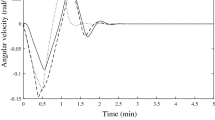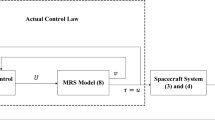Abstract
This paper investigates the problem of global attitude regulation control for a rigid spacecraft under input saturation. Based on the technique of finite-time control and the switching control method, a novel global bounded finite-time attitude regulation controller is proposed. Under the proposed controller, it is shown that the spacecraft attitude can reach the desired attitude in a finite time. In addition, the bound of a proposed attitude controller can be adjusted to any small level to accommodate the actuation bound in practical implementation.
Similar content being viewed by others
References
M. D. Shuster. A survey of attitude representations. Journal of the Astronautical Sciences, 1993, 41(4): 439–517.
P. C. Hughes. Spacecraft Attitude Dynamics. New York: Wiley, 1986.
S. Liu, Z. Geng, J. Sun. Finite-time attitude control: a finite-time passivity approach. IEEE/CAA Journal of Automatica Sinica, 2015, 2(1): 102–108.
J. Zhang, C. Sun, R. Zhang, et al. Adaptive sliding mode control for re-entry attitude of near space hypersonic vehicle based on backstepping design. IEEE/CAA Journal of Automatica Sinica, 2015, 2(1): 94–101.
Y. Xia, N. Zhou, K. Lu, et al. Attitude control of multiple rigid bodies with uncertainties and disturbances. IEEE/CAA Journal of Automatica Sinica, 2015, 2(1): 2–10.
H. Gui, G. Vukovich, S. Xu. Attitude tracking of a rigid spacecraft using two internal torques. IEEE Transactions on Aerospace and Electronic Systems, 2015, 51(4): 2900–2913.
P. Tsiotras. Stabilization and optimality results for the attitude control problem. Journal of Guidance, Control and Dynamics, 1996, 19(4): 772–779.
G. Xing, S. A. Parvez. Nonlinear attitude state tracking control for spacecraft. Journal of Guidance, Control and Dynamics, 2001, 24(3): 624–626.
Y. Xia, Z. Zhu, M. Fu, et al. Attitude tracking of rigid spacecraft with bounded disturbances. IEEE Transactions on Industrial Electronics, 2011, 58(2): 647–659.
B. T. Costic, D. M. Dawson, M. S. de Queiroz, et al. Quaternionbased adaptive attitude tracking controller without velocity measurements. Journal of Guidance, Control, and Dynamics, 2001, 24(6): 1214–1222.
Z. Chen, J. Huang. Attitude tracking and disturbance rejection of rigid spacecraft by adaptive control. IEEE Transaction on Automatic Control, 2009, 54(3): 600–605.
L. L. Show, J. C. Juang, Y. W. Jan. An LMI-based nonlinear attitude control approach. IEEE Transactions on Control Systems Technology, 2003, 11(1): 73–83.
C. Cheng, S. Shu. Application of fuzzy controllers for spacecraft attitude control. IEEE Transactions on Aerospace and Electronic Systems, 2009, 45(2): 761–765.
C. G. Mayhew, R. G. Sanfelice, A. R. Teel. Robust global asymptotic attitude stabilization of a rigid body by quaternionbased hybrid feedback. Proceedings of Joint 48th IEEE Conference on Decision and Control and 28th Chinese Control Conference, Shanghai: IEEE, 2009: 2522–2527.
S. P. Bhat, D. S. Bernstein. Finite-time stability of continuous autonomous systems. SIAM Journal on Control and Optimization, 2000, 38(3): 751–766.
S. Li, S. Ding, Q. Li. Global set stabilisation of the spacecraft attitude using finite-time control technique. International Journal of Control, 2009, 82(5): 822–836.
H. Du, S. Li, C. Qian. Finite-time attitude tracking control of spacecraft with application to attitude synchronization. IEEE Transaction on Automatic Control, 2011, 56(11): 2711–2717.
S. Li, H. Liu, S. Ding. A speed control for a PMSM using finite-time feedback control and disturbance compensation. Transactions of the Institute of Measurement and Control, 2010, 32(2): 170–187.
S. Ding, S. Li, Q. Li. Stability analysis for a second-order continuous finite-time control system subject to a disturbance. Journal of Control Theory and Applications, 2009, 7(3): 271–276.
Y. Shen. Finite-time control of linear parameter-varying systems with norm-bounded exogenous disturbance. Journal of Control Theory and Applications, 2008, 6(2): 184–188.
Q. Hu, B. Li, A. Zhang, et al. Finite-time attitude maneuver control of spacecraft under controlsaturation and misalignment. Control Theory & Applications, 2013, 30(4): 417–424 (in Chinese).
H. Zhang, C. Wang, H. Chen. Finite-time saturated stabilization for a class of nonlinear systemswith dynamic feedback. Control Theory & Applications, 2013, 30(3): 355–359 (in Chinese).
B. Jiang, Q. Hu, M. I. Friswell. Fixed-Time attitude control for rigid spacecraft with actuator saturation and faults. IEEE Transactions on Control Systems Technology, 2016, 24(5): 1892–1898.
Z. Sun, S. Li, X. Zhang. Direct torque control of induction motor based on extended state observer and finite time control scheme. Control Theory & Applications, 2014, 31(6): 748–756.
S. Ding, S. Li. Stabilization of the attitude of a rigid spacecraft with external disturbances using finite-time control techniques. Aerospace Science and Technology, 2009, 13(4): 256–265.
Z. Zhu, Y. Xia, M. Fu. Attitude stabilization of rigid spacecraft with finite-time convergence. International Journal of Robust and Nonlinear Control, 2011, 21(6): 686–702.
Y. Hong, Y. Xu, J. Huang. Finite-time control for robot manipulators. Systems & Control Letters, 2002, 46(4): 185–200.
S. P. Bhat, D. S. Bernstein. Finite-time stability of homogeneous systems. Proceedings of the American Control Conference, Albuquerque, New Mexico: IEEE, 1997: 2513–2514.
Y. Hong, J. Huang, Y. Xu. On an output feedback finite-time stabilization problem. IEEE Transaction on Automatic Control, 2001, 46(2): 305–309.
S. Yu, X. Yu, B. Shirinzadeh, et al. Continuous finite-time control for robotic manipulators with terminal sliding mode. Automatica, 2005, 41(11): 1957–1964.
C. Qian, W. Lin. A continuous feedback approach to global strong stabilization of nonlinear systems. IEEE Transactions on Automatic Control, 2001, 46(7): 1061–1079.
G. Hardy, J. Littlewood, G. Polya. Inequalities. Cambridge: Cambridge University Press, 1952.
J. J. E. Slotine, M. D. D. Benedetto. Hamiltonian adaptive control of spacecraft. IEEE Transaction on Automatic Control, 1990, 35(7): 848–852.
H. Khalil. Nonlinear Systems. 3rd ed. Upper Saddle River: Prentice Hall, 2002: 303–334.
S. Ding, S. Li, Q. Li. Disturbance analysis for continuous finitetime control systems. Journal of Control Theory and Applications, 2009, 7(3): 271–276.
Author information
Authors and Affiliations
Corresponding author
Additional information
This work was supported by the National Natural Science Foundation of China (Nos. 61304007, 61673153), the Ph.D. Programs Foundation of Ministry of Education of China (No. 20130111120007) and the China Postdoctoral Science Foundation Funded Project (Nos. 2012M521217, 2014T70584).
Yusong ZHOU was born in Dingyuan, Anhui, in 1972. He received his B.Sc. degree from Beijing Institute Of Graphic Communication, Bejing, China, in 1996 and the M.Sc. degree from Hefei University of Technology, Hefei, China, in 2010. From July 2015 to August 2015, he was a visiting researcher at Hefei University of Technology. He is currently an Associate Professor in Anhui Vocational College of Press and Publishing. His research interests include electrical automation, control theory and applications.
Wenwu ZHU was born in Suzhou, Anhui, in 1993. He received his B.Sc. degree in Automatic Control from HeFei University of Technology, Hefei, China, in 2015. He is currently pursuing the M.Sc. degree in the School of Electrical Engineering and Automation, Hefei University Of Technology, Anhui, China. His research interests include nonlinear control, and spacecraft attitude control.
Haibo DU was born in Tongcheng, Anhui, in 1982. He received his B.Sc. degree in Mathematics from Anhui Normal University, China, in 2004, and the Ph.D. degree in Automatic Control from Southeast University, China, in 2012. He is currently an Associate Professor in the School of Electrical Engineering and Automation, Hefei University of Technology. His research interests include nonlinear system control, cooperative control of distributed multi-agent systems and spacecraft attitude control.
Rights and permissions
About this article
Cite this article
Zhou, Y., Zhu, W. & Du, H. Global finite-time attitude regulation using bounded feedback for a rigid spacecraft. Control Theory Technol. 15, 26–33 (2017). https://doi.org/10.1007/s11768-017-6057-6
Received:
Revised:
Accepted:
Published:
Issue Date:
DOI: https://doi.org/10.1007/s11768-017-6057-6




